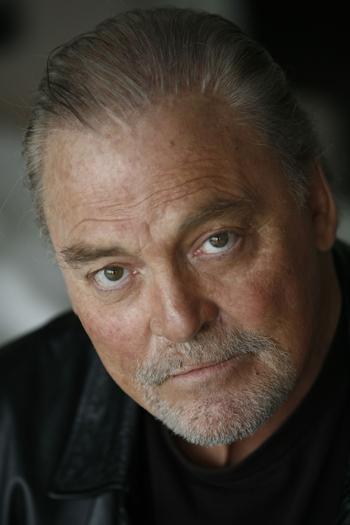Keach and Kahn: A Conversation of Shakespeare—and More
By • August 29, 2012 0 1199

If Stacy Keach and Michael Kahn were cowboys, they might have been Larry McMurtry’s beloved Texas Rangers Gus McRae and Woodrow McCall from “Lonesome Dove,” sitting on a porch, whittling, telling stories of chasing Comanches and stealing horses from Mexican vaqueros.
They’re not cowboys, of course. Keach is an actor of considerable renown, familiar to theater-goers as well as television and film audiences, who has actually played Western anti-heroes like Frank James, brother of Jesse and Doc Holliday in the movies, while Kahn, the artistic director of the Shakespeare Theatre Company, has, to the best of my knowledge, never directed a Western.
On the stage at Harman Hall in the continuation of Kahn’s Classic Conversations as part of the company’s 25th anniversary (Patrick Stewart, Kevin Kline and James Earl Jones were previous participants), the two men, in a free-rambling, loose and informal evening of theater talk, were nothing less than veteran, wise men of the theater—old friends who know each other well and had worked together—talking theater tales.
Being who they are, men of the stage and of Shakespeare, first and foremost, their stories were not about cowboys, Indians and cattle drives, but about the hazards of the “Scottish play,” taking on the monstrously challenging part of “King Lear” after you’ve had a stroke, the nuances inserted by Kahn in Keach’s Richard III walk at the Folger Elizabethan Theatre, playing Nixon and Mike Hammer, although not at the same time, it’s stories about inspirations, admiration, being a young man on Broadway. For Washington audiences, Keach is a familiar figure, having performed in Arthur Kopit’s “Indians” at Arena Stage in the late 1960s, at the Kennedy Center, and under the direction of Kahn as “Richard III” when the company was still at the Folger’s Elizabethan Theatre, where he also did “The Scottish play,” aka “Macbeth,” a play so fraught with potential calamity that actors sometimes dare not mention its name, as legend would have it.
More recently, Keach has appeared in a touring company of “Frost/Nixon,” playing Nixon and in the Goodman Theatre/Shakespeare Theatre Company production of “King Lear.” That’s not to mention a memorable film and television career that include a starring role as a boxer in John Huston’s “Fat City,” a cult classic seen by few but admired by many; a Doc Holliday role opposite Faye Dunaway in “Doc”; Frank James to his brother James Keach’s Jesse in the classic western “The Long Riders”; playing Hemingway in a television mini-series (“I was too young for the part at the time,” he said); and the insouciant, dashing, mustachioed with a cool hat private eye “Mike Hammer” on television; Sergeant Stadanko, nemesis of Cheech and Chong; plus a role in the upcoming “The Bourne Legacy.”
More importantly, he played “Hamlet” three times, played “Macbird,” a biting satire on Lyndon Johnson by way of the Scottish play, and Buffalo Bill in Arthur Kopit’s “Indians,” on Broadway and at Arena Stage. His stage and especially Shakespeare bona fides are impeccable and, if you’ve had the luck to see him, memorable.
“I love Washington. I love coming back here. It’s such a great place,” Keach said. “Is that pillar still at the Folger?” Kahn replied in the affirmative, and both recalled working together in “Richard III” with affection, laughs and forgotten insights. “With Richard, it’s the affliction and what you do with it,” Kahn said. “Remember, as the play goes on, I had you limping at first, and then as he gains more power, he limps less and less until he gets the crown and is walking normally and confidently.”
If you saw Keach, you remember Richard’s self-awareness, his slyness and ability to terrify, a performance every bit as powerful as Laurence Olivier’s film version.
“Those men were my idols, Olivier, Gielgud, Redgrave,” said Keach, remembering himself as a young actor. “That was the standard, until Brando came along and did Marc Anthony and startled the whole world. And I think you could see that there were two distinct styles: the classic British way, letter perfect every time out, and the American way, full of emotion and more spontaneous.”
“It’s something I learned early on and still believe,” Keach said. “You have to find a way every time to go out there and say the lines as if it’s the first time you said them. It’s not always pretty. It’s not always good, but it’s always new and fresh.”
“Your father was an actor, wasn’t he?” Kahn asked. “My dad—he was a Stacy, too—was in radio, you know, doing the old parts like ‘Tales of the Texas Rangers,’ and it was wonderful, the sound effects, the voice, creating a whole world in the electric air.” Even if the theater had been dark, you’d recognize Keach’s voice, too. It’s distinctive and raspy. His voice has got some age on it now—he’s 71 now—but it’s full of tough flavor, chewy and distinct.
Names and tales emerged between the two—the woman who got an Oscar nomination for “Fat City,” singer Judy Collins (You two were quite a romantic item in the ’60s, weren’t you?” Kahn mentioned), working with Joe Papp, playing Mercutio in “Romeo and Juliet,” remembering Eastern Market while doing Richard, wanting to play Teddy Roosevelt.
And Lear. “Tell us about the stroke,” Kahn asked. “Well, I wasn’t a major heart attack or anything, but it was serious, sure, and everybody worried, including myself,” Keach replied. He wanted to do Lear here. His Polish-born wife Magliosa Tomassi did not. “She worried about me,” Keach said. “We had all these doctors around, most of them advising against. But one, I think, said, ‘Oh come on, let the guy do it, he really wants to do it.’ ”
So, we got to see Keach at the Harman, howling on the moor, in a blood-drenched, gutted Serbian landscape, going mad, and it was: Utterly unforgettable.

